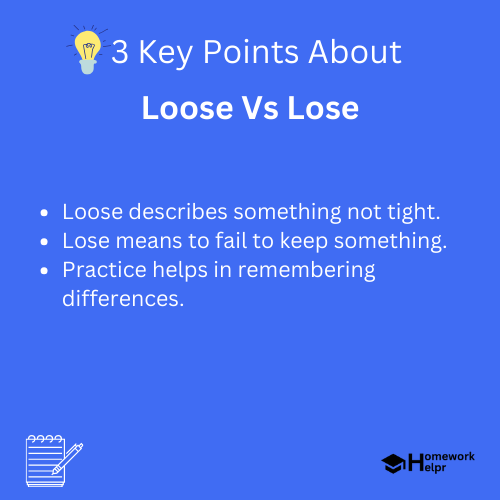📝 Summary
The words loose and lose are often confusing due to their phonetic similarities, but they serve different purposes in English. Loose is an adjective that describes something not tight, applicable to objects or concepts. In contrast, lose is a verb that means to fail to keep something or experience a loss. To help remember the difference, consider the spelling and usage contexts. Understanding these terms is crucial for effective communication in English, and practice is key to mastering them.
Understanding the Difference: Loose vs Lose
The English language can often be quite confusing, especially with words that sound similar but have different meanings. A common pair that stumps many students is ‚Äúloose” and ‚Äúlose.” Despite their phonetic similarities, these words serve distinct purposes in writing and conversation. In this article, we will define each term, look at their usage, and provide tips to help you remember the difference.
The Meaning of ‚ÄúLoose”
The word ‚Äúloose” is an adjective that describes something that is not tight or firmly in place. It can refer to physical objects, such as clothing and items, as well as more abstract concepts like rules or morals. Here are a few contexts in which ‚Äúloose” might be used:
- Her dress was too loose, making her uncomfortable.
- He has a loose interpretation of the rules.
- The dog was running free, with a loose collar.
When thinking of ‚Äúloose,” imagine something that can easily move. A loose bolt might fall out of a bicycle, creating a safety hazard.
Definition
Adjective: A word that describes a noun.
The Meaning of ‚ÄúLose”
In contrast, ‚Äúlose” is a verb that means to fail to keep something, to misplace it, or to be deprived of it. This term is often associated with loss, whether it be a physical object, a game, or even a relationship. Here are some example sentences using ‚Äúlose”:
- If you don’t study for your exams, you might lose marks.
- She will lose her keys if she isn’t careful.
- Don’t lose hope; things will get better!
To further understand ‚Äúlose,” think of a situation where you can‚Äôt find something important to you, like your favorite book or a cherished toy.
Definition
Verb: A word that describes an action or state of being.
How To Remember The Difference?
Many students struggle with knowing when to use ‚Äúloose” versus ‚Äúlose.” However, there are some tricks you can employ to remember each word’s correct usage:
- Look for the spelling: The double ‚Äòo‚Äô in ‚Äúloose” can remind you of a ‚Äúloose” fitting object.
- Think about the action: ‚ÄúLose” requires a verb action; if you’re doing something or experiencing a loss, it’s the right choice.
- Visual mnemonics: Picture a loose shoelace to help connect the adjective with something that isn’t tight.
❓Did You Know?
Did you know that “lose” is one of the most commonly misspelled words in the English language? Many people confuse it with “loose!”
Examples to Illustrate the Difference
To further clarify the distinction, here are some practical examples:
Examples
‚ÄúThe dog chewed the loose flap of the tent, causing it to sag.” (Adjective usage)
‚ÄúIf you don‚Äôt keep an eye on your wallet, you may lose it while traveling.” (Verb usage)
Examples
‚ÄúShe wore a loose sweater that made her look cozy.”
‚ÄúHe always seems to lose his phone during important calls.”
Practice Makes Perfect
Learning the difference between ‚Äúloose” and ‚Äúlose” can take time and practice. A good way to solidify your understanding is by incorporating the words into your daily vocabulary. Here are some activities to try:
- Write sentences using both words; this helps create a mental connection.
- Engage in quizzes or flashcards to test your knowledge.
- Read books or articles aloud, paying attention to where each word is used.

Conclusion
The distinction between ‚Äúloose” and ‚Äúlose” is essential for effective communication in English. By understanding and practicing these terms, you‚Äôll be better equipped to use them correctly in conversation and writing. Remember to associate ‚Äúloose” with something not tight and ‚Äúlose” with experiencing a loss. With enough practice, these words will become second nature to you!
Related Questions on Loose Vs Lose
What does ‘loose’ mean?
Answer: It means something that is not tight.
What does ‘lose’ mean?
Answer: It means to fail to keep or misplace.
How can I remember the difference?
Answer: Think of loose as not tight, lose as losing something.
Is ‘lose’ commonly misspelled?
Answer: Yes, it’s one of the most commonly misspelled words.
